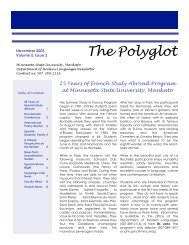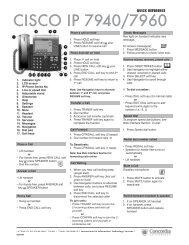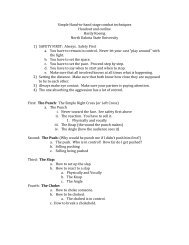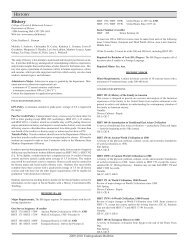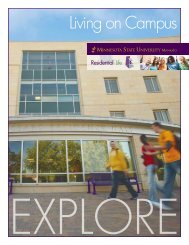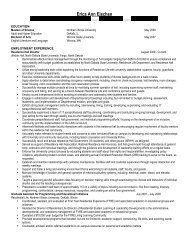Here - Minnesota State University, Mankato
Here - Minnesota State University, Mankato
Here - Minnesota State University, Mankato
Create successful ePaper yourself
Turn your PDF publications into a flip-book with our unique Google optimized e-Paper software.
The Native American Literature Symposium is organized<br />
by an independent group of Indigenous scholars<br />
committed to making a place where Native voices can be heard.<br />
Since 2001,<br />
we have brought together some of the most influential voices in Native America<br />
to share our stories—in art, prose, poetry, film, religion, history, politics, music,<br />
philosophy, and science—from our worldview.<br />
Gwen N. Westerman, Director<br />
<strong>Minnesota</strong> <strong>State</strong> <strong>University</strong>, <strong>Mankato</strong><br />
Virginia Carney, Tribal College Liaison<br />
Leech Lake Tribal College<br />
P. Jane Hafen, Awards Chair<br />
<strong>University</strong> of Nevada, Las Vegas<br />
Gordon Henry, Jr., Publications Editor<br />
Michigan <strong>State</strong> <strong>University</strong><br />
Patrice Hollrah, Vendor/Press Coordinator<br />
<strong>University</strong> of Nevada, Las Vegas<br />
LeAnne Howe, Arts Liaison<br />
<strong>University</strong> of Illinois, Urbana-Champaign<br />
Denise Cummings, Film Wrangler<br />
Rollins College<br />
Theo Van Alst, Film Wrangler<br />
Yale<br />
Evelina Zuni Lucero, Site Coordinator<br />
Institute of American Indian Arts<br />
Jason Zahn, Assistant to the Director<br />
<strong>Minnesota</strong> <strong>State</strong> <strong>University</strong>, <strong>Mankato</strong><br />
The Native American Literature Symposium<br />
PO Box 541 <strong>Mankato</strong>, MN 56002-0541<br />
www.mnsu.edu/nativelit<br />
Albuquerque, New Mexico 1
Wopida, Miigwech, Mvto, Wado, Ahe’ee, Yakoke<br />
We thank the sponsors of the 2012 Symposium for their generous funding and<br />
continued support that made everything possible.<br />
The People of the Pueblo of Isleta<br />
Robert Benavides, Governor<br />
The Redd Center for Western Studies<br />
Hard Rock Albuquerque<br />
Ron Olsen, CEO<br />
The American Indian Studies Series, Michigan <strong>State</strong> <strong>University</strong> Press<br />
The Association for the Study of American Indian Literatures<br />
Michigan <strong>State</strong> <strong>University</strong> Press<br />
<strong>University</strong> of Nebraska Press<br />
We also extend our gratitude to the following people who work behind the scenes<br />
at <strong>Minnesota</strong> <strong>State</strong> <strong>University</strong>, <strong>Mankato</strong> to keep everything functioning and who<br />
provide invaluable encouragement for our cause:<br />
Department of English<br />
Kate Voight, Office Manager<br />
John Banschbach, Chair<br />
College of Arts and Humanities<br />
Walter Zakahi, Dean<br />
And we appreciate the kindness of the following people<br />
who contributed support for our student participants:<br />
Waleila Carey<br />
Cari Carpenter<br />
Robin Cohen<br />
Denise Cummings<br />
Becca Gercken<br />
Pat Kennedy<br />
Nancy Peterson<br />
2<br />
The Native American Literature Symposium 2012
29 March 2012<br />
Albuquerque, New Mexico 3
Book Exhibits and Vendors<br />
Visit the vendors and book exhibits in Grand Ballroom B<br />
Thursday and Friday<br />
10 am to 5 pm<br />
Saturday<br />
10 am to 2 pm<br />
Thank you to the following presses and vendors for their contributions:<br />
Presses<br />
TBA<br />
Vendors<br />
TBA<br />
4<br />
The Native American Literature Symposium 2012
Preliminary Program - Draft Document<br />
Thursday, March 29<br />
10:00 - 11:15<br />
8:30 - 9:45 10:00 8:45 8:00<br />
Nga Whiriwhiri Mātātuhi: Mana<br />
Wahine and Pacific Literature—<br />
Interwoven Narratives, Culture,<br />
and History in the Lives of<br />
Women<br />
ku’ualoha ho’omanawanui,<br />
<strong>University</strong> of Hawai’i Mānoa<br />
Registration (until 4 pm)<br />
Welcome and Traditional Blessing<br />
Vendors and Exhibits (until 5 pm)<br />
Session 2<br />
A (Manzano) B (Bosque) C (Rio Grande)<br />
Transnationalism<br />
White, Black, & Red All Over:<br />
Transnational Regionalism and<br />
Tri-Racial Politics<br />
Alternative Media Indians<br />
The Social World of James Welch<br />
Matthew Herman,<br />
NAS Montana <strong>State</strong> <strong>University</strong><br />
Weaving Generations Together<br />
through Language and Oral<br />
Tradition<br />
Waleila Carey,<br />
<strong>University</strong> of Oklahoma<br />
Royce Freeman,<br />
<strong>University</strong> of Oklahoma<br />
Session 1: Plenary<br />
Our Sea of Stories: New Criticism in Pacific Literary Studies<br />
Kantan Chamorrita: Singing the<br />
Future of Chamoru Poetry<br />
Craig Santos Perez,<br />
<strong>University</strong> of Hawai’i Mānoa<br />
Strangers and Kin: Cherokee<br />
Freedmen and Traditional<br />
Practices of Adoption<br />
Joshua Nelson,<br />
<strong>University</strong> of Oklahoma<br />
Rhetoric, Resistance, and<br />
Regionalism: Oklahoma and<br />
the Geography of Transracial<br />
Recovery<br />
Rachel Jackson,<br />
<strong>University</strong> of Oklahoma<br />
Integrated Play: Particular<br />
Histories and Hidden Relations<br />
in Melvin B. Tolson’s Plays in<br />
Commemoration of Oklahoma’s<br />
Fiftieth Anniversary<br />
Tol Foster,<br />
Marquette <strong>University</strong><br />
Gathering in the Dark and Putting<br />
Down Roots: Kaona References<br />
to Papa in Contemporary Kanaka<br />
Maoli Literature<br />
Brandy Nālani McDougall,<br />
<strong>University</strong> of Hawai’i Mānoa<br />
“The Trees Will Hold Skulls In<br />
Their Branches”: Unearthing The<br />
Gothic In Joseph Boyden’s Three<br />
Day Road<br />
Amy Gore,<br />
Montana <strong>State</strong> <strong>University</strong><br />
A (Re)imagining of the<br />
Indigenous Picturesque:<br />
Reclamation of Images through<br />
Alternative Media<br />
Gavin Healey,<br />
<strong>University</strong> of Arizona<br />
Whose Fantasy Is It Anyway?<br />
Female Representation, Native<br />
American Themes, and the<br />
Authors Who Write about Them<br />
Trisha Durham,<br />
<strong>University</strong> of Cincinnati<br />
Poundin’ Kafi, Makin’ Filé:<br />
Locating Louisiana NDN-Creole<br />
Narratives, Text to Material<br />
Culture<br />
Rain C Goméz,<br />
<strong>University</strong> of Oklahoma<br />
Albuquerque, New Mexico 5
Preliminary Program - Draft Document<br />
Thursday, March 29<br />
Sesson 3: Lunch<br />
A Conversation with Saanii Adil’ini (Tacey M. Atsitty)<br />
11:30 - 1:00<br />
Tacey M. Atsitty, Diné, from Cove, Arizona, is Tsénahabiłnii (Sleep<br />
Rock People) and born for Ta’neeszahnii (Tangle People). She is a<br />
recipient of the Truman Capote Creative Writing Fellowship, the<br />
Corson-Browning Poetry Prize, and the Morning Star Creative Writing<br />
Award. She holds bachelor degrees from Brigham Young <strong>University</strong><br />
and the Institute of American Indian Arts. She is a recent graduate of<br />
the MFA Creative Writing Program at Cornell <strong>University</strong>. She currently<br />
teaches English and Native American Studies at San Juan College in<br />
Farmington, New Mexico. Her work has appeared in Florida Review,<br />
Drunken Boat, Talking Stick: Native Arts Quarterly, New Poets of the<br />
American West Anthology and other publications. Her chapbook<br />
“Amenorrhea” came out in February 2009 from Counting Coup Press.<br />
Session 4<br />
A B C<br />
Postcolonial Interpretations Indigenous Crossings:<br />
Performing Gender and<br />
Representing the Other<br />
The Power of Poetry<br />
1:30 - 2:45<br />
A Postcolonial Study of the Novels<br />
of Louise Erdrich<br />
Meghan Glass,<br />
Durham <strong>University</strong><br />
Pan Indianism: A Racialized,<br />
Reflexive Cosmopolitanism?<br />
Dakota Gaehel Littlewolf-<br />
Spencer,<br />
Montana <strong>State</strong> U., Bozeman<br />
Gender Matters, Indigenous<br />
Futures: Writing and Reading In<br />
the Land of the Grasshopper Song<br />
Susan Bernardin,<br />
SUNY-Oneonta<br />
Passing Strange: Queer Characters<br />
and Female Masculinity in Native<br />
American Literature<br />
Lisa Tatonetti,<br />
Kansas <strong>State</strong> <strong>University</strong><br />
His Handsome Young Men: The<br />
Queer Life of an Oilman by John<br />
Joseph Mathews<br />
Michael Snyder,<br />
Oklahoma City Community<br />
College<br />
Poets, Players, and Pacific<br />
Northwest Indigenous Literary<br />
Anticolonialism<br />
Carol Edelman Warrior,<br />
<strong>University</strong> of Washington<br />
“That Is Why I Sent You to<br />
Carlisle”: Carlisle Poetry and the<br />
Demands of Americanization<br />
Poetics and Politics<br />
Cristina Stanciu,<br />
Virginia Commonwealth<br />
<strong>University</strong><br />
Break<br />
3:00 - 3:30<br />
Sponsored by the Association for the Study of American Indian Literatures<br />
6<br />
The Native American Literature Symposium 2012
Preliminary Program - Draft Document<br />
Thursday, March 29<br />
Session 5<br />
A<br />
Survivance<br />
B<br />
Intersections of Western and<br />
Indigenous Science in American<br />
C<br />
Authorship and Perspective in<br />
Contemporary Native Literature<br />
Indian Poetry and Fiction<br />
3:30 - 4:45<br />
At Home with Saligugi and Sears:<br />
Tradition and Innovation in Tom<br />
Holm’s The Osage Rose<br />
Laura Adams Weaver,<br />
<strong>University</strong> of Georgia, Athens<br />
Ceremonial Survivance at Carlisle<br />
Indian School: Momaday’s Child<br />
Resisters<br />
Kenneth Roemer,<br />
<strong>University</strong> of Texas at Arlington<br />
This Place I Call Home:<br />
Regionalism as Poetic Survivance<br />
in the Works of Carter Revard,<br />
E.A. “Tony” Mares, & Kimberly L.<br />
Becker<br />
Lynette Wise Leidner,<br />
<strong>University</strong> of Oklahoma<br />
Panel Chair: Ellen Arnold,<br />
East Carolina <strong>University</strong><br />
“The Wasted Land:” A Reading<br />
Janet McAdams,<br />
Kenyon College<br />
Spacetimes and Settler<br />
Colonialism<br />
Joseph Bauerkemper,<br />
<strong>University</strong> of <strong>Minnesota</strong>, Duluth<br />
“Keen-Eye:” A Reading<br />
Gladys Cardiff,<br />
Oakland <strong>University</strong><br />
Stories in the Blood + Signature of<br />
Survivance = Genetic Therapy<br />
Jessica Bardill,<br />
U. of Illinois, Urbana-Champaign<br />
Using ‘Medicine Power to<br />
Uncover the Answer’: A Dene<br />
Reading of Richard Van Camp<br />
Angela Semple,<br />
<strong>University</strong> of Saskatchewan<br />
Going Native: the Consumption<br />
of Identity in Ledfeather<br />
Miriam Brown-Spiers,<br />
<strong>University</strong> of Georgia, Athens<br />
Sensationalizing Trauma or<br />
Hard-Core Reality? Scalped’s<br />
(Re)presentation of Life on the<br />
Rez<br />
Carrie Sheffield,<br />
<strong>University</strong> of Tennessee, Knoxville<br />
5 - 6<br />
Dinner on your own<br />
6:00 - 9:00<br />
Sesson 6<br />
Film Screening and Discussion with New Mexico Filmmakers<br />
Denise K. Cummings, Rollins College<br />
Theo Van Alst, Yale<br />
Leah Sneider, <strong>University</strong> of New Mexico<br />
Film Titles TBA<br />
Albuquerque, New Mexico 7
8:00<br />
Preliminary Program - Draft Document<br />
Friday, March 30<br />
Registration (until 4 pm) 10:00 Vendors and Exhibits (until 5 pm)<br />
Session 7<br />
A (Manzano) B (Bosque) C (Rio Grande)<br />
Readings<br />
Connecting Spiritual and<br />
Red Ink<br />
Physical Writing<br />
8:00 - 9:15<br />
“Breakfast at the Western Cafe”<br />
Marie Claymore,<br />
Montana <strong>State</strong> <strong>University</strong><br />
Sing<br />
Allison Hedge Coke,<br />
<strong>University</strong> of Nebraska Kearney<br />
Travis Hedge Coke,<br />
<strong>University</strong> of Nebraska Kearney<br />
The Gift of Wind and Writing:<br />
Bridging the Oral/Written Binary<br />
in Anishinaabe Literature<br />
Niigaanwewidam James Sinclair,<br />
<strong>University</strong> of Manitoba<br />
“I am not . . . Postmodern”:<br />
Visionary Knowledge in Gordon<br />
Henry’s The Failure of Certain<br />
Charms<br />
Tammy Wahpeconiah,<br />
Appalachian <strong>State</strong> <strong>University</strong><br />
RED INK: The History and<br />
the Future of Native American<br />
Publishing in the Advent of a New<br />
Era<br />
Sheila Rocha,<br />
<strong>University</strong> of Arizona<br />
Ashley Tsosie<br />
Joe Quintana<br />
April Petillo<br />
M’Naa Giigdaa Learning to Speak<br />
in a Good Way<br />
JoAnn DiNova and Lila Pine,<br />
Ryerson <strong>University</strong><br />
Simon Ortiz<br />
Session 8<br />
A B C<br />
Responses to Colonialism Engaging with the Past in<br />
Sources of Story<br />
Contemporary Literature<br />
9:30 - 10:45<br />
We Are All Native <strong>Here</strong>: Colonial<br />
Critique and Its Queer Errant<br />
Jodi Byrd,<br />
U. of Illinois, Urbana-Champaign<br />
History Through Tradition and<br />
Literature<br />
Melissa Michal,<br />
Pennsylvania <strong>State</strong> <strong>University</strong><br />
Interspecies Activism in William<br />
Sanders’ “At Ten Wolf Lake”<br />
Brian K. Hudson,<br />
<strong>University</strong> of Oklahoma<br />
Religious Conversion and Louise<br />
Erdrich’s Possible Answers to<br />
Oskison’s “Problem”<br />
Martha Viehmann,<br />
Sinclair Community College<br />
Voicing the Bones: Heid Erdrich’s<br />
Poetry Speaking the Silences of<br />
NAGPRA<br />
Karen M. Poremski,<br />
Ohio Wesleyan <strong>University</strong><br />
“The past is very much right<br />
here and now”: Temporality and<br />
History in Silko’s Ceremony<br />
Michael Emerson,<br />
Northwestern Michigan College<br />
The New “Native Hero”: Battling<br />
with Basketball on the Reservation<br />
Tria Andrews,<br />
<strong>University</strong> of California, Berkeley<br />
From the Glittering World: A<br />
(Transnational) Navajo Story<br />
Robin Riley Fast,<br />
Emerson College<br />
8<br />
The Native American Literature Symposium 2012
Preliminary Program - Draft Document<br />
Friday, March 30<br />
11:00 - 12:15<br />
Session 9<br />
A B C<br />
Citizenship & Identity Visualizing Indigenous Gender:<br />
Representations of Native<br />
Americans in Contemporary<br />
Film<br />
Indigenous Women in the World<br />
“The Truth” about Truth & Bright<br />
Water: Thomas King’s Restoration<br />
of Indians into the Contemporary<br />
Landscape<br />
John D. Kalb,<br />
Salisbury <strong>University</strong><br />
“Writing under Duress:” Reading<br />
between the Lines and Filling in<br />
the Blanks in Ella Deloria’s Little<br />
Known Performance Art<br />
Susan Gardner,<br />
U. of North Carolina at Charlotte<br />
Cultural Mediation Through<br />
Captivity in Charlotte Lennox’s<br />
Euphemia<br />
Shannon Toll,<br />
<strong>University</strong> of Oklahoma<br />
Wind In All Their Hair: Indian<br />
Masculinity as Coming Attraction<br />
in Hollywood<br />
Becca Gercken,<br />
<strong>University</strong> of <strong>Minnesota</strong>, Morris<br />
Where are the Does in Randy<br />
Redroad’s The Doe Boy?<br />
Channette Romero,<br />
<strong>University</strong> of Georgia<br />
Living Two Spirits<br />
Brian Twenter,<br />
<strong>University</strong> of South Dakota<br />
From Indonesia to New Mexico:<br />
Matrilineal Culture in the Works<br />
of A. A. Navis and Leslie Marmon<br />
Silko<br />
Robin Cohen and Nita Novianti,<br />
Texas <strong>State</strong> <strong>University</strong><br />
Shinnobi Girls Back <strong>Here</strong> in the<br />
World: Young Ojibwe Women of<br />
the Vietnam War Era in Selected<br />
Narratives and the Writing of<br />
Fiction<br />
Linda LeGarde-Grover,<br />
<strong>University</strong> of <strong>Minnesota</strong>, Duluth<br />
Trans-Choctalking:<br />
Transnationalism in LeAnne<br />
Howe’s Evidence of Red<br />
Steven B. Sexton,<br />
<strong>University</strong> of Oklahoma<br />
Sesson 10: Lunch<br />
12 :15 - 1:30<br />
3 - 3:30<br />
A Conversation with Myla Vicenti Carpio<br />
Myla Vicenti Carpio is of the Jicarilla Apache Nation and from Laguna<br />
and Isleta Pueblos in New Mexico. After completing her undergraduate<br />
work at the <strong>University</strong> of New Mexico in 1992, Dr. Vicenti Carpio<br />
earned a master’s degree in history from Arizona <strong>State</strong> <strong>University</strong>.<br />
Continuing her educational career at ASU, Myla went on to receive her<br />
Ph.D. in history in 2001. Myla currently works as an Assistant Professor<br />
in the American Indian Studies Department at Arizona <strong>State</strong> <strong>University</strong>.<br />
Her courses include Introduction to American Indian Studies, Issues<br />
in Urban Indian Country, American Indian Studies Research Methods,<br />
and Readings in Colonization/Decolonization. Her research areas<br />
include Indigenous history, urban issues, gender and sexuality, and<br />
decolonization. Her new book is Indigenous Albuquerque.<br />
Break<br />
Albuquerque, New Mexico 9
Preliminary Program - Draft Document<br />
Friday, March 30<br />
Session 11<br />
Enduring Critical Poses: International Readings of American Indian Literature<br />
Panel Chair: Gordon Henry, Jr., Michigan <strong>State</strong> <strong>University</strong><br />
1:45 - 3:00<br />
Affiliation and Filiation: Going beyond the Use of Avivah Zornberg’s Counter-Narrative to a Reading of<br />
James Welch’s Fools Crow according to Positioning and Ethics as Related by Silvia Martínez-Falquina<br />
Stuart Rieke,<br />
Sisseton-Wahpeton Tribal College<br />
In Search of a Sovereign Author: Empire, Nation, and the Conundrum of Native Literary Criticism<br />
Francesco Melfi,<br />
Cleveland <strong>State</strong> <strong>University</strong><br />
X-ing Boundaries: Transmotion and Transformation in Contemporary Anishinaabeg Writing<br />
David Stirrup,<br />
<strong>University</strong> of Kent<br />
3:30 - 4:45<br />
TBA<br />
Jesse Peters,<br />
<strong>University</strong> of North Carolina Pembroke<br />
Session 12<br />
A B C<br />
IAIA Reading<br />
SAI Writers: Cross-Genre<br />
Considerations of Dissent/<br />
Descent<br />
Indigenizing Environmental<br />
Justice<br />
A 50 Year Legacy: The Story<br />
Continues<br />
Evelina Lucero,<br />
Institute of American Indian Arts<br />
New Tropes of Pan-Indian<br />
Empowerment: Carlos<br />
Montezuma’s Wassaja as a<br />
Domain of Defiance<br />
Julianne Newmark,<br />
New Mexico Tech<br />
The Haudenosaunee Future of<br />
Laura Cornelius Kellogg<br />
Cari Carpenter,<br />
West Virginia <strong>University</strong><br />
The Story of My People: Chauncey<br />
Yellow Robe Across Genres<br />
Kathleen Washburn,<br />
<strong>University</strong> of New Mexico<br />
Toward an Indigenized<br />
Environmental Justice Theory<br />
Dina Gilio-Whitaker,<br />
<strong>University</strong> of New Mexico<br />
Scorched Earth, Clearcut Logging<br />
on Native Land, Shaman Coming<br />
to Fix<br />
Jan Johnson,<br />
<strong>University</strong> of Idaho<br />
Native American Literary Water<br />
Ecologies and the Search for<br />
Justice<br />
William Huggins,<br />
Independent Scholar<br />
10<br />
The Native American Literature Symposium 2012
Preliminary Program - Draft Document<br />
Friday, March 30<br />
Sesson 13: Dinner<br />
Writing on the Crest of Revolution: A Choctaw in King Abdullah’s Court<br />
6:00 - 9:00<br />
LeAnne Howe is an enrolled citizen of the Choctaw Nation of Oklahoma. She<br />
writes fiction, poetry, screenplays, scholarship, and plays that deal with native<br />
experiences. Author of three awarding winning books, (including the American<br />
Book Award, and the Oklahoma Book Award). Howe’s fiction appears in Fiction<br />
International, Callaloo, Story, Yalobusha Review, Kenyon Review, Cimarron<br />
Review, and elsewhere. Her work has been translated in France, Italy, Germany, the<br />
Netherlands, and Denmark.<br />
Recent artistic and scholarly accomplishments include: the William J. Fulbright<br />
Scholarship to Amman Jordan, 2010-2011 to research a new novel set during the<br />
Arab Revolt in 1917; on March 5, 2011, Howe was Awarded Tulsa Library Trust’s<br />
“American Indian Author Award” at Central Library, Tulsa, OK. Returned from<br />
Jordan to receive the award.<br />
In June, 2011: NAISA (Native American and Indigenous Studies Association)<br />
voted Reasoning Together, The Native Critics Collective, one of the ten most<br />
influential books in the first decade of the twenty-first century by the membership of over 800 scholars. Howe’s<br />
chapter, “Blind Bread and the Business of Theorymaking By Embarrassed Grief as Told by LeAnne Howe”. . . .<br />
appears in the collection - a short story couched within literary criticism. In November 2011, she was named by<br />
Maynard Institute for Journalism Education as one of 30 American Indians authors to celebrate the works of,<br />
during November’s Native American Heritage Month.<br />
In 2007, Howe appeared on Jon Stewart’s The Daily Show on Comedy Central in a news segment about sports<br />
mascots titled, Trail of Cheers. [She’s afraid this might be the pinnacle of her career.] She was the John and Renee<br />
Grisham Writer-in-Residence at the <strong>University</strong> of Mississippi at Oxford, MS, 2006-2007. Her plays have been<br />
performed at the Mark Taper Forum in Los Angeles, and in New York at the Smithsonian.<br />
Currently, when not gallivanting around the Middle East, Howe is a Professor of English, American Indian<br />
Studies at the <strong>University</strong> of Illinois, and former Director of the MFA program in Creative Writing. She makes her<br />
homes in Ada, Oklahoma; Urbana-Champaign, Illinois, and most recently Amman, Jordan.<br />
Albuquerque, New Mexico 11
8:00<br />
Preliminary Program - Draft Document<br />
Saturday, March 31<br />
Registration (until 4 pm) 10:00 Vendors and Exhibits (until 2 pm)<br />
Session 14<br />
A (Manzano) B (Bosque) C (Rio Grande)<br />
The Past<br />
Language<br />
Speaking the Unspoken, Hearing<br />
What Isn’t Said: Revisiting<br />
Perspectives on Elsie’s Business<br />
8:00 - 9:15<br />
Conflicting Ontologies and<br />
Contradictory Epistemologies in<br />
Silko’s Almanac of the Dead<br />
Chezia Thompson Strand,<br />
Maryland Institute College of<br />
Art/Spectrum of Poetic Fire<br />
Food Imagery in Welch’s The<br />
Heartsong of Charging Elk<br />
Brandy Alba,<br />
Concordia <strong>University</strong> Texas<br />
X-Marks of a Queer Citizenship:<br />
The Radical Sovereignty of<br />
Stephen Graham Jones<br />
Andrew Uzendoski,<br />
<strong>University</strong> of Texas at Austin<br />
Choctalking: The Realities Of<br />
Fiction & Leanne Howe’s Shell<br />
Shaker<br />
Padraig Kirwan,<br />
Goldsmiths, <strong>University</strong> of London<br />
Pamela Campbell<br />
Sherrie L. Stewart<br />
Khara Ellasante<br />
April D. J. Petillo,<br />
<strong>University</strong> of Arizona<br />
The Poetics of Susan Deer Cloud<br />
Vanessa H. Diana,<br />
Westfield <strong>State</strong> <strong>University</strong><br />
Julia Kristeva and the Pups:<br />
Theorizing a Tlicho Abject<br />
Scott Andrews,<br />
Cal <strong>State</strong> Northridge<br />
Session 15<br />
The Ethical [Literary] Treatment of the Dead and Living Indians<br />
Panel Chair: LeAnne Howe, <strong>University</strong> of Illinois<br />
Moderator: Jill Doerfler, <strong>University</strong> of <strong>Minnesota</strong>, Duluth<br />
11:00 - 12:15<br />
Patrice Hollrah, <strong>University</strong> of Nevada, Las Vegas<br />
P. Jane Hafen, <strong>University</strong> of Nevada, Las Vegas<br />
Gordon Henry, Jr., <strong>University</strong> of Michigan<br />
Virginia Carney, Leech Lake Tribal College<br />
Gwen Westerman, <strong>Minnesota</strong> <strong>State</strong> <strong>University</strong>, <strong>Mankato</strong><br />
Jodi Byrd, Commentator, <strong>University</strong> of Illinois, Urbana-Champaign<br />
12<br />
The Native American Literature Symposium 2012
Preliminary Program - Draft Document<br />
Saturday, March 31<br />
Session 16<br />
A B C<br />
A Corpse Tail<br />
Storytelling in Word and Image:<br />
Teaching Native Graphic Novels<br />
Alienation<br />
11:00 - 12:15<br />
Byron F. Aspaas,<br />
Sasha Lapointe,<br />
Kateri Menominee,<br />
Veronica Jourdain,<br />
Collestipher Chatto,<br />
The Institute of American<br />
Indian Arts<br />
Panel Chair: Nancy J. Peterson,<br />
Purdue <strong>University</strong><br />
Static Pictures, Sequenced Images:<br />
The Flow of Time in Indigenous<br />
Comics<br />
Jeff Berglund,<br />
Northern Arizona <strong>University</strong><br />
Native Comics and Graphic<br />
Novels as Expressive Forms<br />
Kimberly Roppolo,<br />
<strong>University</strong> of Oklahoma<br />
Show and Tell: Visual Acuities and<br />
Narrative Possibilities in Native<br />
Graphic Texts<br />
Susan Bernardin,<br />
SUNY-Oneonta<br />
The Artisans of Terror: Violence,<br />
the Limits of Decolonization,<br />
and Restorative Justice in Leslie<br />
Marmon Silko’s Almanac of the<br />
Dead<br />
Thomas Krause,<br />
<strong>University</strong> of Oklahoma<br />
Belief in a Time of Trauma: Simon<br />
Ortiz’s Rosebud Reservation<br />
Winter<br />
Reginald Dyck,<br />
Capital <strong>University</strong><br />
American Indian Literary History<br />
& Human Rights Discourse:<br />
Diane Glancy’s Pushing the Bear<br />
Tereza M. Szeghi,<br />
<strong>University</strong> of Dayton<br />
“So Who is Listening Anyway?”:<br />
Issues of Audience and Teaching<br />
the Oral Tradition<br />
Barbara K. Robins,<br />
<strong>University</strong> of Nebraska at Omaha<br />
Sponsored by the ASAIL<br />
Pedagogy Committee<br />
12:30 - 1:30<br />
Session 17: Lunch<br />
A Conversation with Simon Ortiz<br />
Simon J. Ortiz writes poetry and prose that is at once honest and unfettered,<br />
and yet challenging. Using the simplest of language, Ortiz evokes the most<br />
complex feelings, and often a longing for the experiences about which he<br />
writes. In much of his work he maintains a simple tone that belies the<br />
adversity of his life. What Ortiz writes is important because he is teaching<br />
the art of experience, and doing it through language. Not suprisingly, he<br />
believes language is an important vehicle for finding and knowing who we<br />
are and professes a strong belief in the power of the oral traditions of his<br />
people. Although his words often seem innocent, the observations he makes<br />
could only come from one who has known the harshness of reality. That he<br />
manages such a firm belief in the power of experience and spirituality in the<br />
face of difficulty, is something well worth learning, a lesson that Ortiz, as<br />
well as Native Americans have to teach.<br />
Albuquerque, New Mexico 13
Preliminary Program - Draft Document<br />
Saturday, March 31<br />
Session 18<br />
Staged Reading of The Museum of Red Earth by Kimberly Blaeser<br />
1:45 - 3:00<br />
Ryan Winn, College of Menominee Nation<br />
Kimberly Blaeser, <strong>University</strong> of Wisconsin, Milwaukee<br />
Amber Blaeser-Wardzala, 7th Grade, St. Mary’s School<br />
LeAnne Howe, <strong>University</strong> of Illinois<br />
Niigaanwewidom James Sinclair, <strong>University</strong> of Manitoba<br />
3:00 - 5:00<br />
Sesson 19<br />
ASAIL Business Meeting<br />
(Sunrise Room)<br />
14<br />
The Native American Literature Symposium 2012




